Nearly everyone is familiar with rooster crowing, which is usually described as, “cock-a-doodle-doo!” Yet, a rooster sound is more than just a wake up alarm.
A rooster call can have many different meanings, depending on the context. So, why do roosters crow, what time do roosters crow, and what does it mean?
Why Do Roosters Crow?
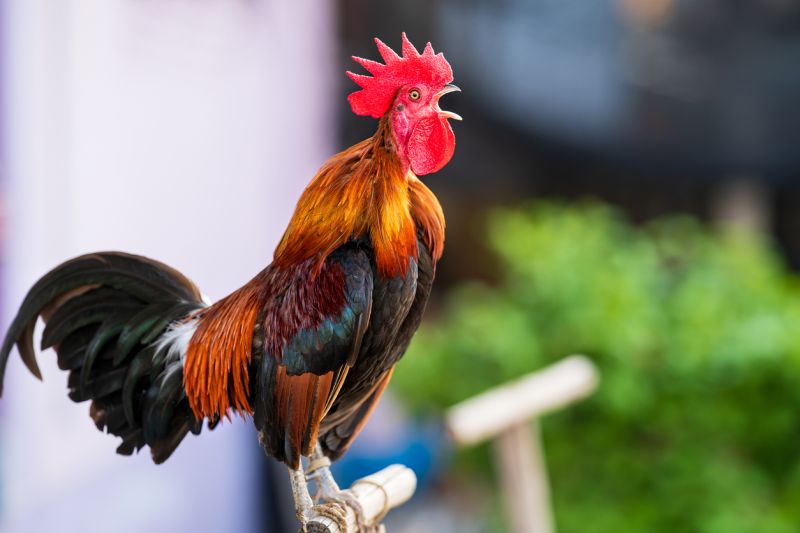
There are many reasons why roosters crow. The time of day and the sound of the crow may help you understand the reasoning behind it. So, when the rooster crows, it could mean any of the following things.
Morning Announcement
The most common rooster crowing meaning is that it’s the morning. When roosters crow before sunrise, it’s to let the flock know that it’s time to scare off predators and forage for food.
The “head rooster” will always be the first one to crow during a rooster wake up call. If there are other roosters in the flock, they will join in after.
There is still a lot unknown about the question, “why do roosters crow in the morning?” It mostly has to do with their internal clock that lets them know to crow at the same time every morning. A rooster morning call can be annoying to humans trying to sleep, which is why it’s a not a good idea to have roosters if you live close to other people.
Announce Territory
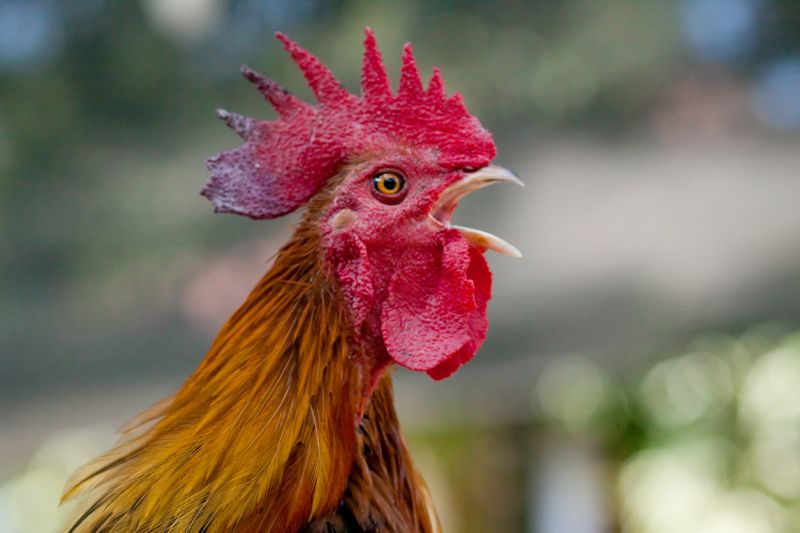
Crowing is also a way for roosters to let other animals know that they’re there. It’s to warn roosters from other flocks to stay away from their territory and hens.
Roosters are often mistaken for being aggressive, but they like to avoid fights if possible. Crowing back and forth usually prevents fights because it allows the chickens to know how far away unfamiliar birds are and it allows them time to get away from dominant birds.
These behaviors come from the rooster’s history. In the wild, chickens often traveled through jungles with dense plants. It was difficult for them to see other birds approaching, so roosters would crow to let creatures know that they’re coming.
Alerting of Danger
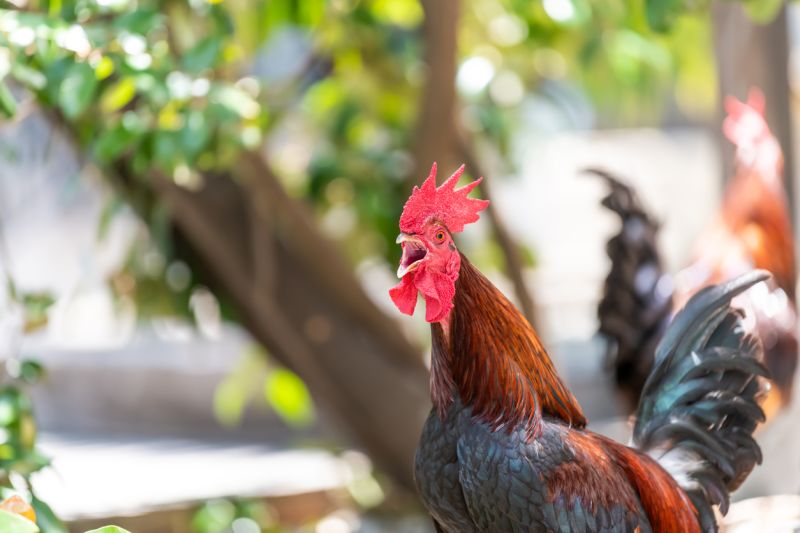
Roosters will let out an alarmed crow if they think there’s a threat near their territory. Alarm crows most commonly occur at night. If you hear a rooster crowing at night, it might be a sign that a predator is approaching the flock.
Luckily, chickens have great hearing, so if there’s a rooster screaming in a panic, the other chickens will flee for cover or freeze depending on the situation. Roosters have excellent eyesight that allows them to see animals in the distance better than humans can.
Not all rooster alarms will be in reference to something life-threatening. It’s common for roosters to get spooked by unfamiliar things at night, such as a car starting or a light turning on. They might mistake unusual sounds for predators and let out an alarming call anyway.
Mating
A chicken crowing could be related to mating. Roosters may crow to attract hens that are also looking for a mate. A rooster calling hens may be ready to mate and very determined. They could even attempt to steal a hen from another rooster.
Roosters also crow after mating with a hen. The reason is unclear, but it could be their way of bragging to other birds. They may let out similar crows if their hen lays an egg.
Some people believe the answer to “why do roosters crow at dawn?” also has to do with mating. Rooster may have a surge in testosterone in the morning, so this could be another attempt to try to attract a mate. The early evening is another common time for roosters to seek out a mate.
Asserting Dominance
If you have several roosters in your flock, they might crow at each other to assert dominance. One rooster is always considered the “boss” or “head rooster.” Roosters may crow as a way to fight over that position.
The way the head rooster is chosen is unclear. All the roosters seem to have an agreed understanding of who is most dominant, but they will often crow or quarrel to confirm it. The most dominant rooster is usually the loudest and the one that always win fights.
If the roosters start crowing together, the head rooster will always be the one to get the last word in. He’s also the one that starts the crowing in the morning.
When Do Roosters Crow?
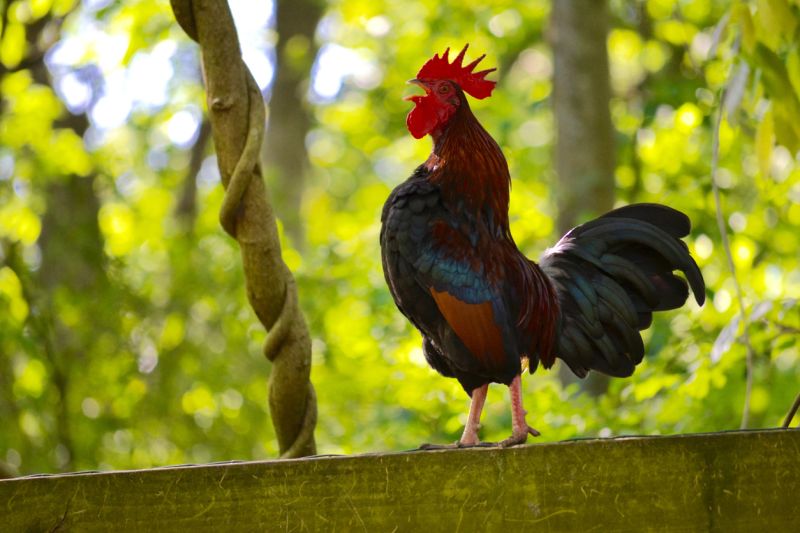
Most people believe that roosters only crow early in the morning, but the answer to “when do cockerels crow?” is more complicated than that. Early mornings are the most common time for rooster crowing, but roosters will crow whenever they feel like it.
The times rooster crow at vary based on their reason for crowing. They may crow early in the morning as a wake up call, but they could also crow throughout the day if they’re mating or getting into fights. They could even crow at night if they sense danger.
Many new keepers wonder, “why do roosters crow all day?” Most roosters won’t crow nonstop all day, but it’s normal for them to crow throughout the day. Crowing is their way of expressing themselves, just like how hens present their emotions through various sounds. So, a rooster crowing all day isn’t a cause for concern because it’s a way for them to communicate.
How Loud is Rooster Crowing?
Some people mistake rooster crowing for being insanely loud. It may wake up close neighbors, but it won’t wake up a whole neighborhood. A rooster’s crow is usually about 90 decibels, which is the equivalent of a dog barking.
Hen or rooster clucking is slightly quieter at around 70 decibels, which is about the same as humans talking to each other. So, roosters and hens are both significantly quieter than loud music, leaf blowers, and even some vehicles driving by.
Ways to Prevent Rooster Crowing
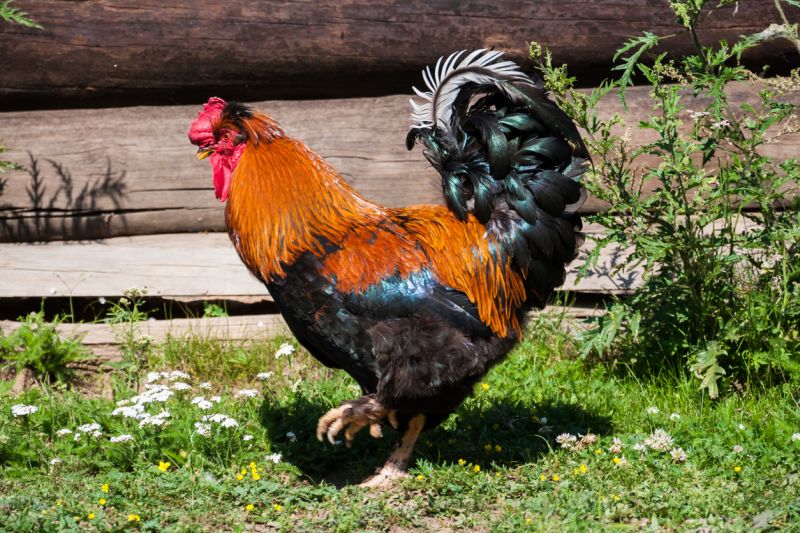
There’s no way to stop a loud rooster from crowing, but there are ways to prevent the frequency of noise. Here are a few ways to help minimize the rooster sounds on your property.
Get More Hens
Roosters tend to crow more often if there aren’t many hens in the flock. If there are more hens, the roosters will be busier, which will cause them to crow less. Keeping the rooster near the hens is another great way to lessen the amount of cock crowing.
If you don’t want fertilized eggs, then you don’t need any roosters. Hens will lay infertile eggs regardless of if there’s a rooster around. So, if the noise of a rooster is intimidating to you, you can raise chickens for eggs without one.
Have Less Roosters
More hens is a great option, but it’s also a good idea to have less roosters. Roosters may fight with each other to compete for the hens, which could cause them to get loud. Usually, it’s a good idea to have about one rooster per every ten hens.
If you need several roosters, but they don’t get along, you can have several chicken enclosures. That way, you can keep the roosters with their hens while avoiding conflict with other roosters.
Use Artificial Lighting
For those who like to sleep in, a rooster crowing in the morning might be unpleasant. A rooster morning sound, along with several other types of calls, can be prevented using artificial lighting in their coop.
A rooster at dawn wakes up and starts crowing because of their internal clocks. As the sun comes up, they know it’s time to let out their morning alert. Yet, if you set up a light in your rooster’s coop to turn on and off at specific times, you might be able to trick him.
Set the light to stay on after the sun goes down so he thinks the daylight is later than usual. Then, he might wait to crow until you let him out of his coop. Your rooster will likely crow at other times during the day, but this method can help you get a little more sleep.
Keep Roosters Entertained
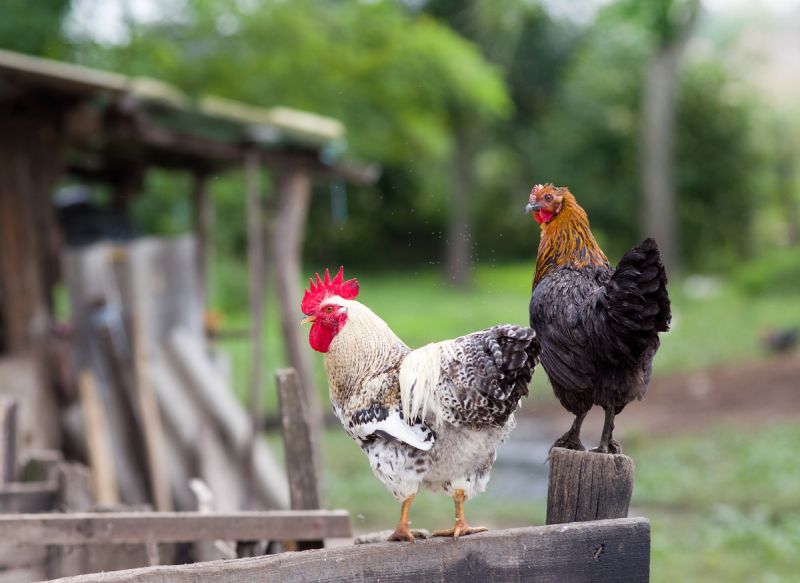
Like most animals, roosters can get bored. If they don’t have anything else to do, they may become noisy just for fun. To make the rooster cry less frequently, you can find ways to keep your roosters busy.
Chicken toys are a great way to keep birds entertained in their enclosure. Some keepers also have a mobile coop so they can give their birds new places to explore every once in a while.
Use a Rooster Collar
If all else fails, you can try a no crow collar. Rooster collars are designed to restrict some airflow when the bird tries to crow, making it feel uncomfortable. It might not stop the crowing completely, but it’ll make the roosters less likely to do it.
Some consider rooster collars inhumane, but as long as they’re not too tight, they won’t cause pain. However, some keepers choose types of surgeries to reduce crowing, such as on the rooster’s neck or testicles. These procedures are considered harmful and inhumane. Unlike a dog getting neutered, a rooster’s surgery can be risky and life-threatening.
So, if you’re considering surgery, you should re-home your rooster instead for their safety.
Frequently Asked Questions
A lot of people have questions about rooster crowing. Here are some things you might be wondering about these unique chicken sounds.
Every rooster breed is different, but most chickens will start crowing between 8 and 20 weeks old. At first, their crows might not sound like crows at all. They’ll start off small and faint. Yet, over time, the birds will get the hang of it.
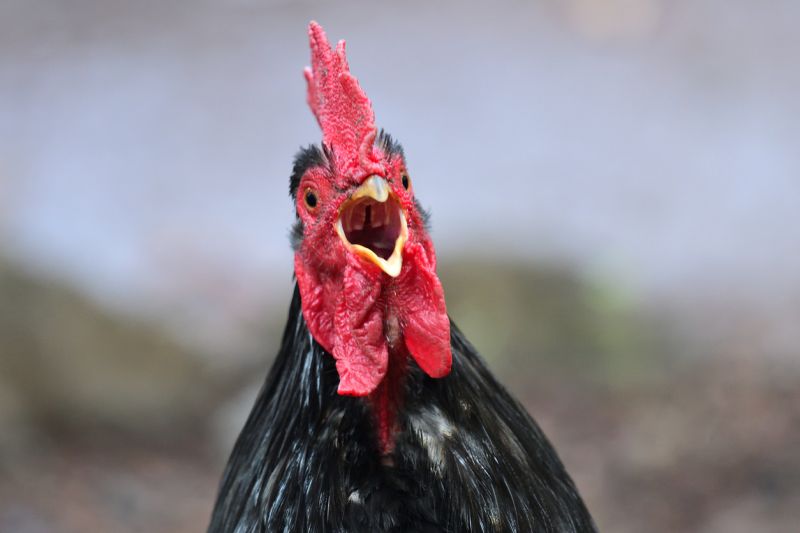
“Do chickens crow?” is a common question for new keepers. It’s obvious that roosters crow, but some people may be surprised to learn that hens can crow too!
Hens may crow to establish their dominance in the flock. Most hen sounds are much softer than that, but if you hear them crowing, there’s likely some type of competition going on in the coop.
Final Thoughts
It can be annoying when a rooster crows, but it’s a normal behavior for these birds. They don’t only crow to start the day, but they can also make sounds to let other animals know how they’re feeling. Chicken sounds can protect your flock and make life easier for them.
If you don’t like the idea of a bird disrupting your peace and quiet, then it’s best not to have roosters. Roosters are most commonly kept to produce more chickens, so if you only need infertile eggs, then a rooster isn’t necessary. Consider those factors before welcoming a rooster onto your property.